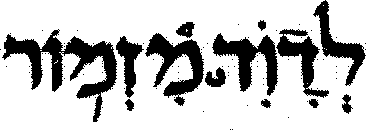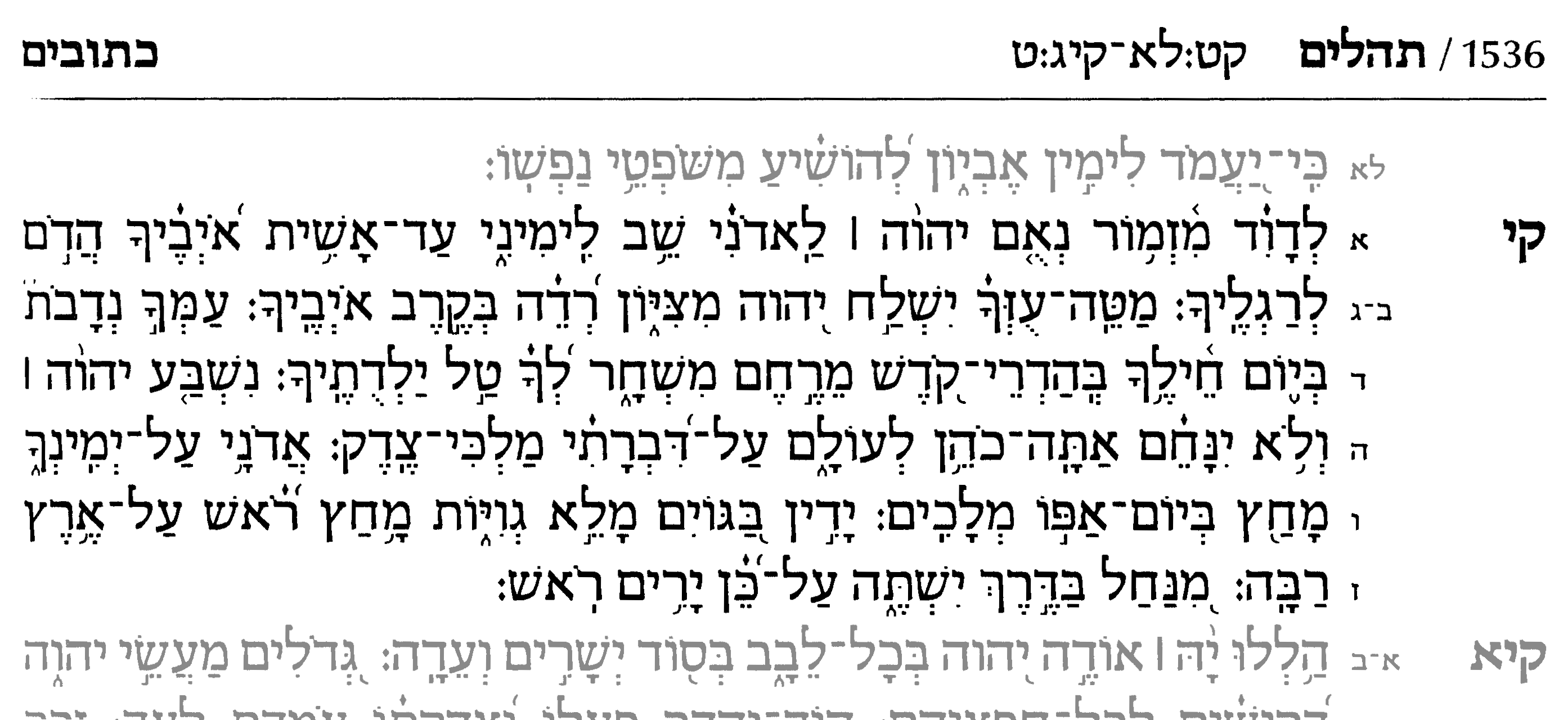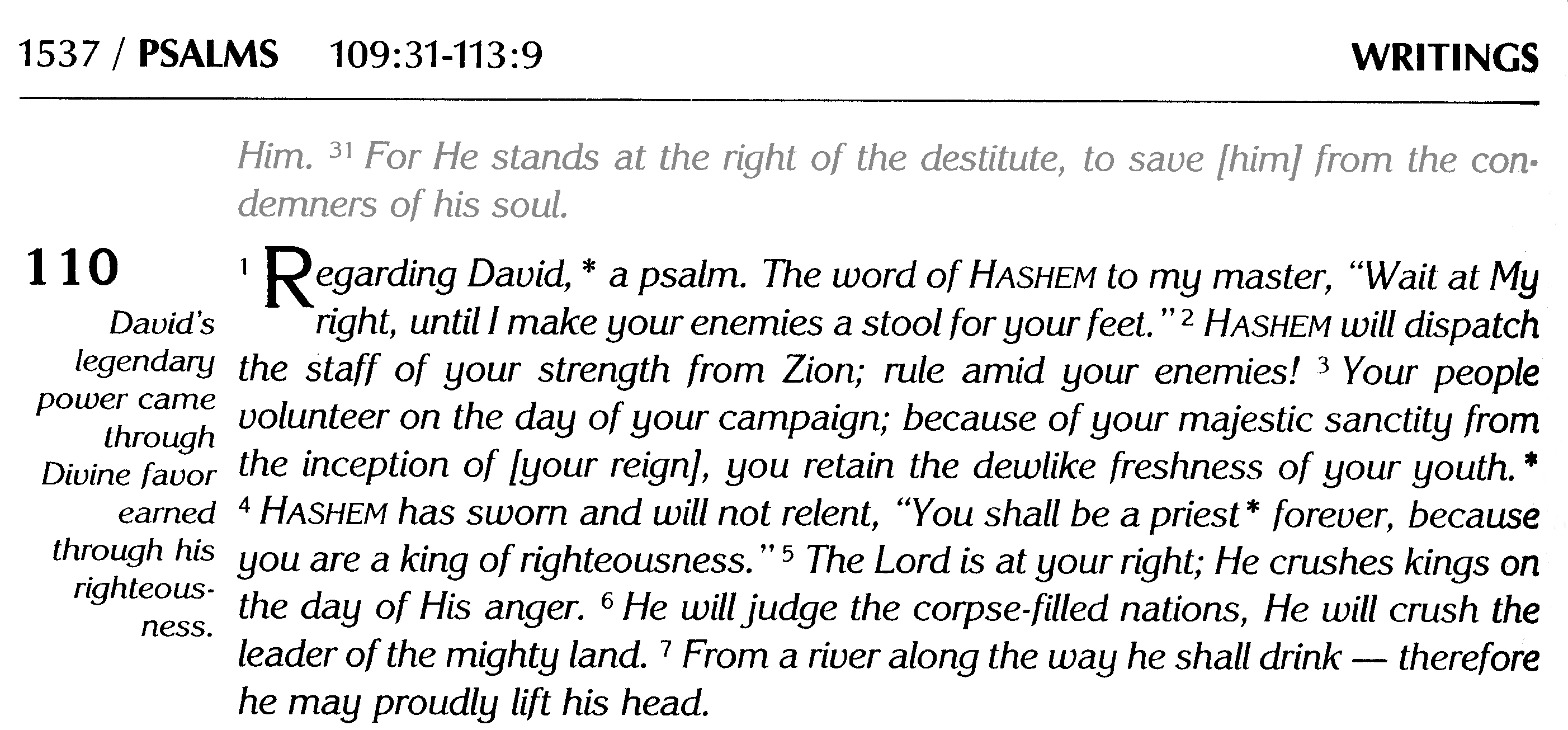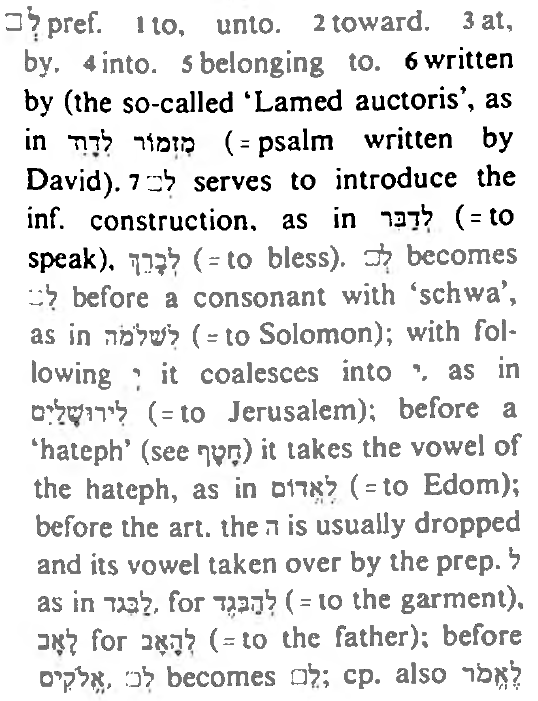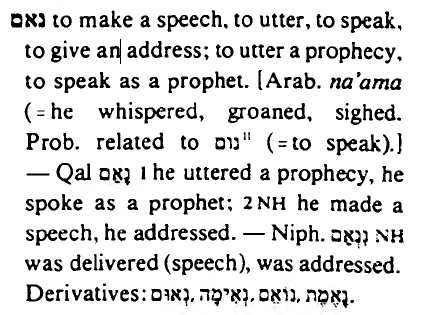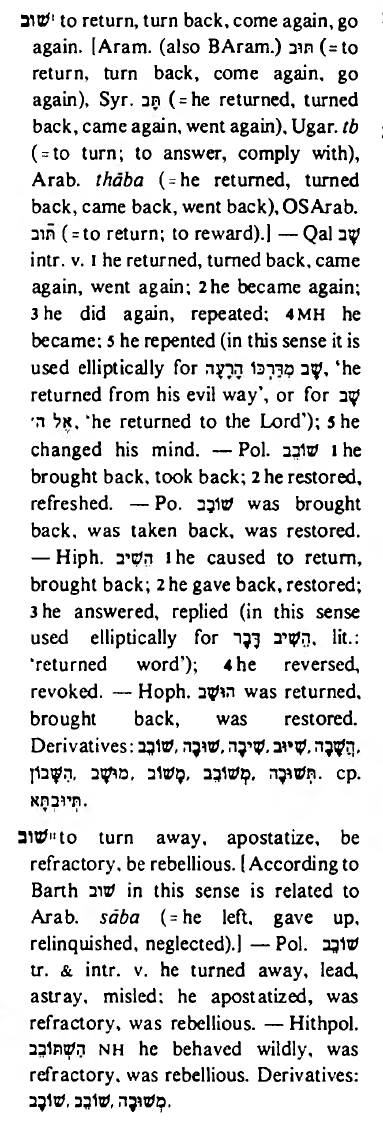| Sat, 20 Apr 2024 05:22:48 -0500 Yom Shabbat, Chodesh Sheni 11, 6024 — יום שבעי חדש שני יא ו׳כד |
|
|
|
תְּהִלִּים קי
— Psalms 110
"Returning" To יְהֹוָה [YehoVah] |
|
At The Iconoclast, we believe that Psalms 110 is a critically important passage. It is actually referred to in the New Testament book of Matthew (Ch. 22) by Yeshua. Interestingly, Yeshua quotes it to illustrate that the Mashiach, even as described by King David, was greater than David! To present this Psalm, we are using a number of screen captures of texts as well as scans of documents to help illustrate and analyse the text. We begin with three screen captures of the Psalm, the first two from two different pdf sources of the Aleppo Codex. Both pdf versions of the Aleppo Codex are taken from the same photographs, but the second is from a more widely distributed version which includes information regarding the passages on that page (Book/Chapter/Verse To Chapter/verse). That pdf source is darker and harder to read than the former (Aleppo_Codex.pdf, although both pdf's of the same photographic source are difficult to read for this stated passage). Regardless, the Aleppo Codex was damaged in a riot in Aleppo Syria (see our page on The Name יהוה [YehoVah] In The Aleppo And Leningrad Codices for more information). The first two screen captures from the Aleppo Codex are then followed by the passage as found in the Leningrad Codex, which is much clearer and easier to read. Thus, for this passage in Psalms, because of the better clarity in the Leningrad Codex, we use it as the reference. After showing the screen grabs from the Aleppo and Leningrad Codices, we show a scan of the Psalm as found in the Koren Tanakh, whose English translation is the very best we have found from any English version regardless of origin. Still, there is one word found in the very first sentence after the introductory note ( לְדָוִד מִזְמוֹר L'David Mizmor – A Psalm of David) which we believe has caused great misunderstanding of this Psalm, particularly from traditional Jewish sources. In our opinion, knowing this introductory phrase using the sourced Hebrew text is essential in truly understanding the intent and purpose of this Psalm! Below the English translation from the Koren Tanakh, we present the passage verse by verse from the Leningrad Codex, each with our English interpretation and any notes we feel are relevant. With the initial passage and the first verse we have added screen captured images from Ernest Klein's A Comprehensive Etymological Dictionary Of The Hebrew Language For Readers Of English as references to help understand the initial introductory phrase as well as the Hebrew word most often translated as "SIT" (we believe this translation/interpretation is incorrect and hope that this study presents its meaning clearly). It is our desire to render the understanding of this particular Psalm in the manner which we feel is most relevant to present the Mashiach of יהוה [YehoVah]. Please note that this page is unfinished (as of March 1, 2015) in that it only has commentary/analysis for verse one. We will update this page as we have more to provide. Suffice it to say, this page is a work in process! |
|
|
|
תְּהִלִּים קי — Psalms 110 In The Aleppo And Leningrad Codices
Aleppo_Codex.pdf, p527, Column 1 (begins 3rd line from top)
Aleppo Codex (262.pdf), p535, column 1
Leningrad Codex (264.pdf), p783, column 2, middle תְּהִלִּים קי — Psalms 110 In The Koren Tanakh
|
| Psalms 110 –Analyzing The Verses |
|
לְדָוִד מִזְמוֹר le.da.vid miz.mor Translation: A Psalm written by David. You might ask why we even provide any information regarding this short introductory phrase. Unfortunately, rabbinical translations have heavily muddied the waters regarding this Psalm, especially with the translation of the introductory phrase, but also the 4th verse. Importantly, after changing the plain meaning of the introductory phrase, the Stone Tanakh takes verse 4, which is very clear in the Hebrew, and derives a meaning after the same manner of obfuscation. To us, this appears that they have intentionally confused the plain meaning intended by King David! To illustrate this, we provide scans of the Stone Tanakh for Psalms 110:
Stone Tanakh — Psalms 110, Hebrew, English & Commentary: Rabbinical and other modern Jewish commentators follow the same logic as that of the Stone Tanakh in presenting this as if it was a Psalm written to King David, rather than by King David. Taking that view ensures that the entire passage will be understood from the point of view of one who admires King David and expresses his feelings with majestic language. Moreover, taking the point of view that the Psalm was written to King David, ensures that the rabbinical English interpretation of the fourth verse must take on a completely different meaning than written in order to fit within the framework begun by the misinterpreted introduction! Thus, any meaning that otherwise might be interpreted to be talking about the King Mashiach, and particularly to be pointing to Yeshua, are rendered non-sensical! We present a screen capture from the above mentioned Dictionary by Ernest Klein where we find a nice interpretive definition for the opening phrase to Psalms 110 in the definition for the letter "Lamed".
Thus, our interpretation follows Klein's definition that the opening phrase is saying that the following mizmor (Psalm) is written by King David. |
|
לְדָוִד מִזְמוֹר נְאֻם יְהוָה לַאדֹנִי שֵׁב לִימִינִי עַד־אָשִׁית אֹיְבֶיךָ הֲדֹם לְרַגְלֶיךָ׃
Translation: By David, A Psalm.
Our transliteration/interpretation: לְדָוִד מִזְמוֹר le.da.vid miz.mor Translation: A Psalm written by David.
נְאֻם יְהוָה לַאדֹנִי
ne.um a.do.nai la.do.ni
שֵׁב לִימִינִי
shev li.mi.ni
עַד־אָשִׁית אֹיְבֶיךָ
ad-a.shit oi.vei.kha
הֲדֹם לְרַגְלֶיךָ׃
ha.dom le.rag.lei.kha
Because the phrase begins by expressing that YehoVah speaks/says to L'Adoni, we want to ensure that our interpretation is taken to mean that this is a prophetic utterance by YehoVah, and not just any saying. Ernest Klein provides a good explanation for the word transliterated herein as נְאֻם ne.um and to which we have rendered (Thus, YehoVah prophetically speaks to My Lord/My Master):
לְדָוִד מִזְמוֹר נְאֻם יְהוָה לַאדֹנִי שֵׁב לִימִינִי עַד־אָשִׁית אֹיְבֶיךָ הֲדֹם לְרַגְלֶיךָ׃ le.da.vid miz.mor ne.um a.do.nai la.do.ni shev li.mi.ni ad-a.shit oi.vei.kha ha.dom le.rag.lei.kha: The salient word in this verse is שֵׁב (pronounced "Shev"). This word is written using the two hebrew letters, shin vet. The primary definition of the root word שׁוב (shin-vav-vet) is to return, turn back, come again, go again Secondary definitions can be to repent, to turn away, even to apostatize (which even in this context could follow a more traditional rendering to utterly change behavior and return!). We would like to note that in virtually every translation we have researched, this word is interpreted to mean "SIT"! We want to make it clear that there is a perfectly good hebrew word which means "SIT". That word, יֹשֵׁב , begins with the hebrew letter "yod" but follows with these same letters, shin-vet. In both the Aleppo and Leningrad codices, it is quite clear that there is absolutely no letter "yod" preceding the word שֵׁב (shin-vet), so it would otherwise look quite similar (but the words have different roots!). Moreover, שֵׁב [Shev] (RETURN) is the logical meaning even though the majority of texts (indeed, all versions that we are aware of!) have it translated/interpreted as "SIT" — as if King David wrote a completely different word! This Psalm as written by King David, was prophetically declaring that his Master/Lord, the King Mashiach was to RETURN TO THE RIGHT [HAND] OF יְהֹוָה [YehoVaH] — UNTIL יְהֹוָה [YehoVaH] would place His enemies to be a footstool to his feet! If He were to RETURN to the Right [hand] of יְהֹוָה [YehoVaH], it is certainly clear that the deliverer of Israel, as described within this Psalm and to whom David referred to as לַאדֹנִי "l'Adoni" (My Lord), would necessarily be of a heavenly (i.e. divine) influence, having an "anointing" greater than that of King David! To interpret שֵׁב [Shin-vet] as if David wrote יֹשֵׁב [Yod-Shin-Vet] would not carry the sense of RETURNING, but merely that of waiting (i.e. sitting). We believe that King David wrote this Psalm purposefully, with the intention of showing that His Lord/His Master was to "RETURN", and not merely "SIT/WAIT" at the Right of YehoVah! Further, we believe that what is meant by שֵׁב לִימִינִי [Shev l'Ymini] literally means to RETURN TO יְהֹוָה [YehoVaH]. What Does It Mean TO RETURN TO יְהֹוָה [YehoVaH] IF NOT TO RETURN TO FOLLOWING THE INSTRUCTION OF THE TORAH? We would like this to be understood! Please review the following screen capture from Klein's dictionary. The word, שֵׁב [Shev], defined within Ernest Klein's dictionary, along with derivatives:
|
|
Verse 2
מַטֵּה־עֻזְּךָ יִשְׁלַח יְהוָה מִצִּיּוֹן רְדֵה בְּקֶרֶב אֹיְבֶיךָ׃ ma.te uz.kha yish.lakh ye.ho.va mi.tsi.yon re.de be.ke.rev oi.vei.kha: |
|
Verse 3
עַמְּךָ נְדָבֹת בְּיוֹם חֵילֶךָ בְּהַדְרֵי־קֹדֶשׁ מֵרֶחֶם מִשְׁחָר לְךָ טַל יַלְדֻתֶיךָ׃ am.kha ne.da.vot be.yom khei.le.kha be.had.rei-ko.desh me.re.khem mish.khar le.kha tal yal.du.tei.kha: |
|
Verse 4
נִשְׁבַּע יְהוָה וְלֹא יִנָּחֵם אַתָּה־כֹהֵן לְעוֹלָם עַל־דִּבְרָתִי מַלְכִּי־צֶדֶק׃ nish.ba a.do.nai ve.lo yi.na.khem a.ta-kho.hen le.o.lam al-div.ra.ti mal.ki-tse.dek: |
|
Verse 5
אֲדֹנָי עַל־יְמִינְךָ מָחַץ בְּיוֹם־אַפּוֹ מְלָכִים׃ a.do.nai al-ye.min.kha ma.khats be.yom-a.po me.la.khim: |
|
Verse 6
יָדִין בַּגּוֹיִם מָלֵא גְוִיּוֹת מָחַץ רֹאשׁ עַל־אֶרֶץ רַבָּה׃ ya.din ba.go.yim ma.le ge.vi.yot ma.khats rosh al-e.rets ra.ba: |
|
Verse 7
מִנַּחַל בַּדֶּרֶךְ יִשְׁתֶּה עַל־כֵּן יָרִים רֹאשׁ׃ mi.na.khal ba.de.rekh yish.te al-ken ya.rim rosh: |
|
This site is dedicated to the unadulterated pursuit of truth. |
|
Site Last Updated:
Last Israel New Moon: Copyright © 2007–2024— Email WebMaster: |
April 11, 2024
2024-04-09 [2] Robert M. Pill WebMaster |
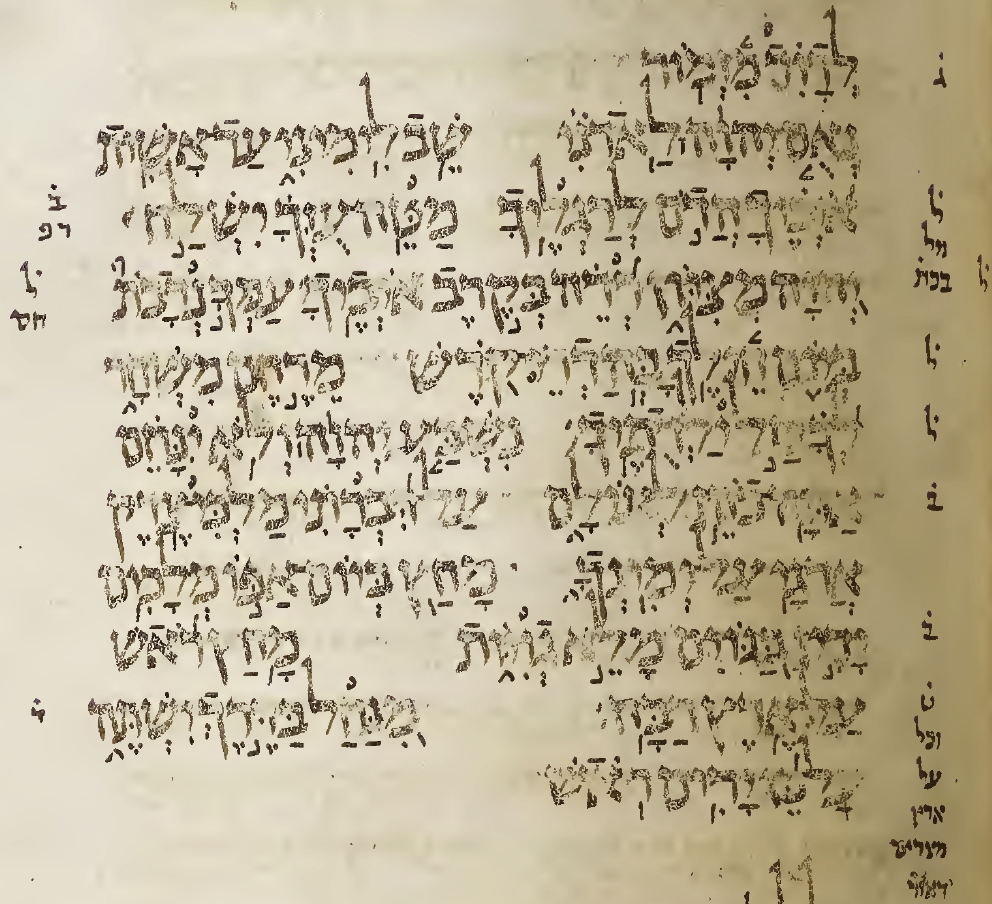
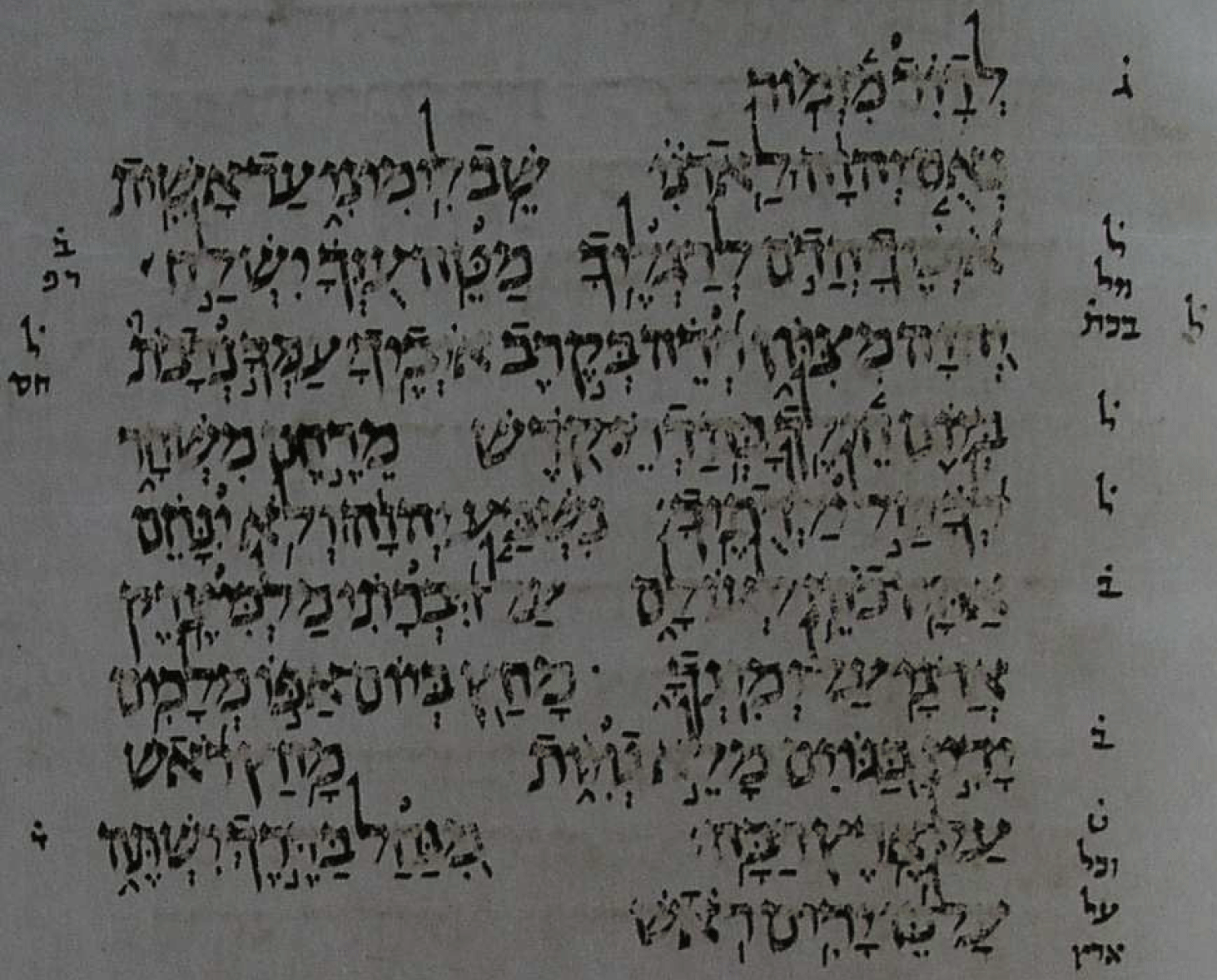
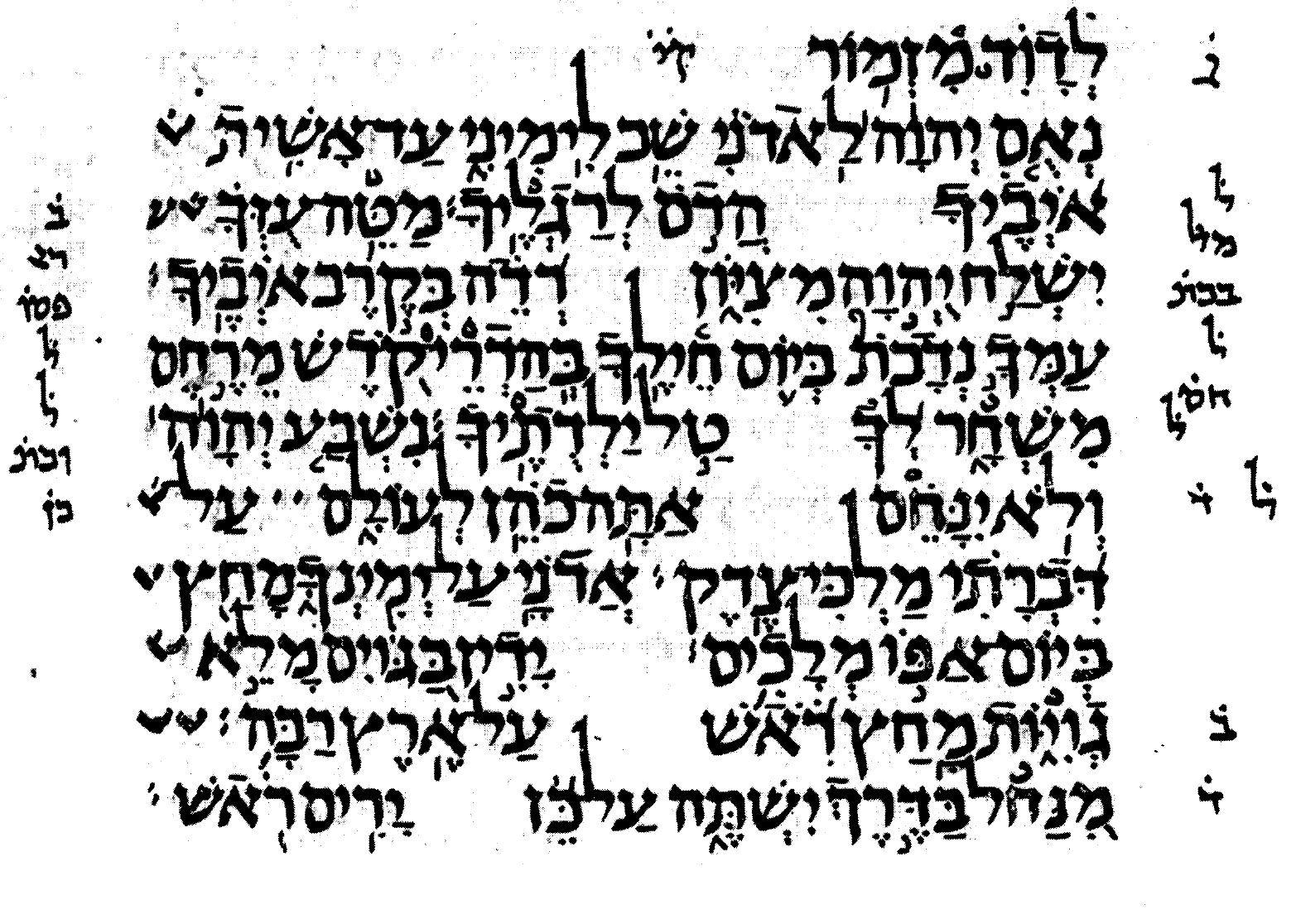
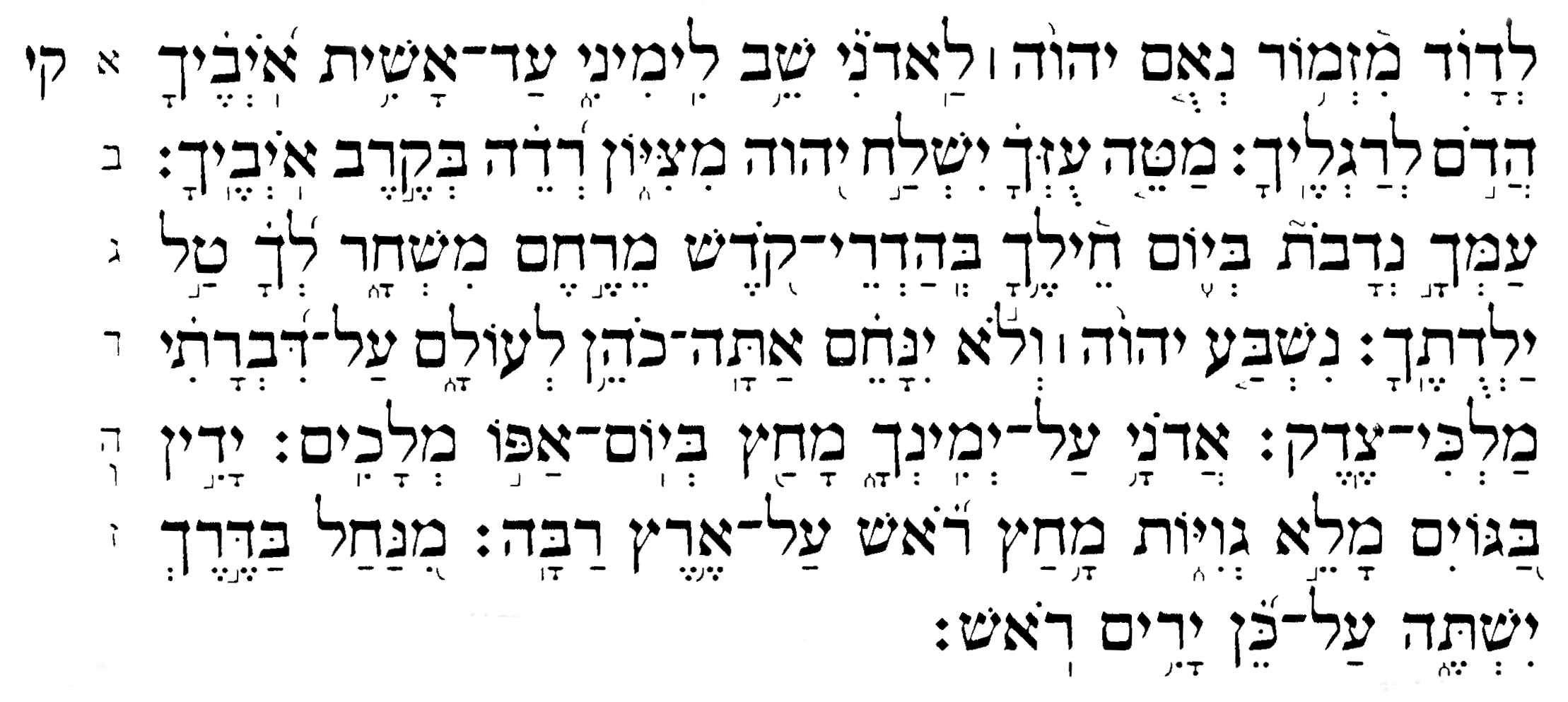
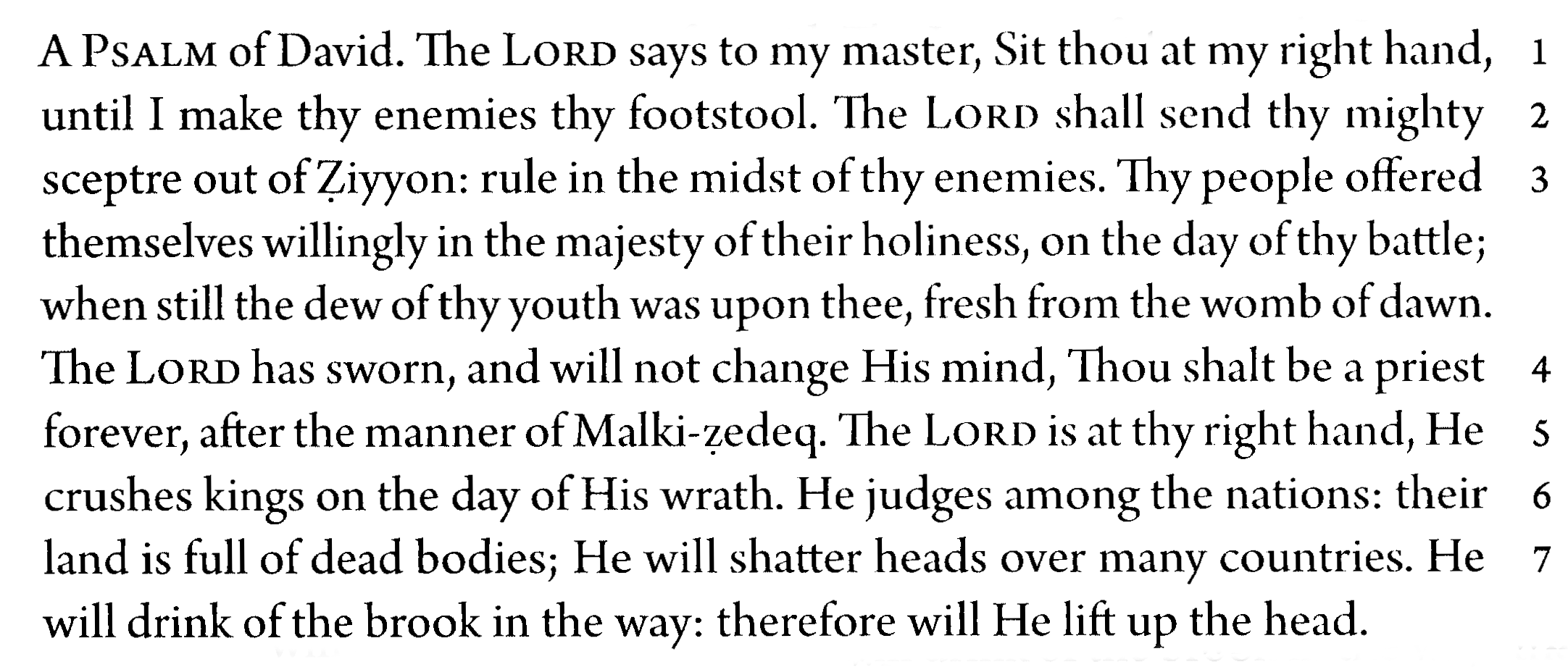 Scan of Psalms 110 from the Koren Tanakh
Scan of Psalms 110 from the Koren Tanakh